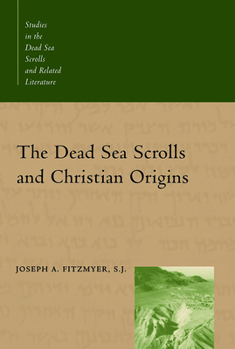The Dead Sea Scrolls and Christian Origins
Select Format
Select Condition 
Book Overview
Gathers recent research that provides background to the Bible and Christianity. This volume by Joseph Fitzmyer, a pioneer in the field of Dead Sea Scrolls research, collects twelve of his recent studies on the Scrolls, including a new essay on Qumran messianism. Well known for his landmark work in Aramaic studies and on the Semitic background of the New Testament, Fitzmyer explores how the Scrolls have shed light on the interpretation of biblical themes and on the rise of early Christianity. All of the articles in this volume have been updated to take into account current discussions.
Format:Paperback
Language:English
ISBN:0802846505
ISBN13:9780802846501
Release Date:March 2000
Publisher:William B. Eerdmans Publishing Company
Length:308 Pages
Weight:1.00 lbs.
Dimensions:0.9" x 6.2" x 9.2"
Customer Reviews
2 ratings
Aramaic Studies and a Jewish Context for Christianity
Published by Thriftbooks.com User , 19 years ago
Nobody pulls together in fine scholarly fashion what we know about the people who authored and collected the Dead Sea Scrolls and their relationship, such as it is, to nascent Christianity as does Fr. Fitzmyer, S.J. I've been reading his stuff for years. Fitzmyer is scholarly, somewhat dry, and impeccably honest. His academic credentials are first-rate. He's one of the major contributors (in partnership with the legendary Scripture scholar Raymond E. Brown) to the New Jerusalem Biblical Commentary, as well as a number of critical commentaries in the Anchor Bible series (including the mighty tome on Paul's epistle to the Romans). In this collections of essays published in 2000, some reworked in a salutary fashion to meet modern standards, Fr. Fitzmyer first sets up his methodology, explaining to the reader how he comes to his conclusions from the weath of data available. Some of the most interesting essays include "The Aramaic 'Son of God' Text from Qumran Cave 4" (in which he examines the title "Son of God" and its various flavors in this Semitic literature), the related article "The Background of 'Son of God' as a Title for Jesus" (in which Fitzmyer examines the Semitic - as opposed to Greek Septuagintal - context for "Son of God" in the New Testament in the light of the scrolls), and "Qumran Messianism" in which the often otherwise oversimplified messianic references are further explored and qualified. I also enjoyed the "Tobit" essays inasmuch as they demonstrate the value of what many Christians and Jews consider extra-canonical literature to the keepers of the scrolls. In short, Fitzmyer shoots down both those who say the scrolls have nothing to do with Christianity, and those who say that figures like John the Baptist and Jesus himself show up in coded fashion in those same scrolls. Fr. Fitzmyer also paints a context in which the Jewishness of what we Christians call the New Testament plays a fundamental role.
Do the scrolls mention Jesus?
Published by Thriftbooks.com User , 21 years ago
The Dead Sea Scrolls are (for the most part) a collection of Hebrew and Aramaic writings from the centuries of the early occupation of Israel by the Romans. This coincides with a great time of change and diversity in Judaism, which included at that time at least three main sects (one might even go so far as to say, denominations): Saduccees, Pharisees, and Essenes. It also had within itself the seeds of two others: rabbinic Judaism and Christianity, both of which largely (and ironically) came out of the same strand: the Pharisees.Joseph Fitzmyer (a Jesuit) has put together an interesting study in what is a major topic of interest to many scholars -- just what is the relation of these scrolls to Christianity? Because none of the scrolls as yet can be said to contain New Testament writings (those few fragments that might are very obscure, very ambiguous, and exceedingly small -- consisting of few words).'This volume collects twelve studies on the Dead Sea Scrolls by Joseph Fitzmyer, including a new, never-before-published essay of Qumran messianism. A pioneer in the field of Scrolls research and well known for his work in Aramaic studies and in the Semitic background of the New Testament, Fitzmyer here explores particularly how the Scrolls have shed light on the Qumran community itself, on the interpretation of significant biblical themes, and on the rise of early Christianity.'Fitzmyer has been working on the Scrolls since 1955; many of the essays in this book date originally to the early part of his career, but have been revised and updated to reflect the latest discoveries and interpretations in scroll research. Prior to the discovery of the Dead Sea Scrolls, there was very little information on the nature of Palestinian Judaism of this period -- the writings of Josephus and Philo provided some information, but the explosion in knowledge really occurred with the scrolls. There are limits to the usefulness of Josephus and of Philo for interpretation; the scrolls offer another leg for the stand.'Because the writings of Philo are cast in a philosophical mold and indulge in Alexandrian allegorical interpretation of the Old Testament, they are not so useful for historical information about Judean Judaism of for the understanding of early Christianity and the interpretation of the New Testament.'Fitzmyer discusses the political situation in the 1940s and 50s that resulted in the domination of scroll research by Christian scholars who, untrained in rabbinic Judaism, originally interpreted the scrolls in primarily or exclusively Christian terms. He credits more recent scholars, including Rabbi Lawrence Schiffman, for reclaiming the Jewish nature of the scrolls, and showing their primary importance to understanding nascent rabbinic Judaism, and contemporary research now progresses with this firmly in mind.Fitzmyer explores the ideas of John the Baptist as a member of the Essenes, of Jesus' Jewish affiliation (was he an Essene too? or a Pharisee?) 'Althou





